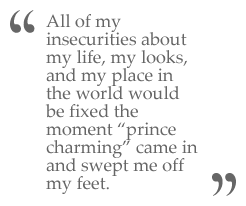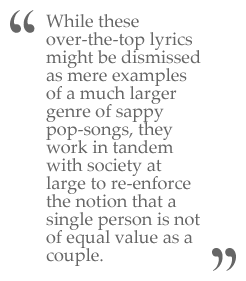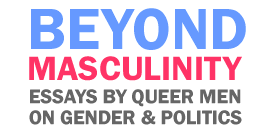
or years, I
had a single problem. From the moment I stepped out of
the closet and admitted to myself that I was gay, I
immediately began to feel insecure about not having a
man in my life as a romantic partner. What began as
simple adolescent insecurity developed into a complex as
I grew into early adulthood. The older I got, the more
deficient I felt for not having someone to love me. I
was excelling academically in college, building a solid
and successful career in politics, and establishing and
developing very meaningful friendships. I had it all, or
at least as much as anyone in their early twenties could
expect to have. Yet, I felt as though my life was
lacking in some way. No matter how good life was, this
problem – this single problem – persisted.
 I assumed that it would go away the minute I found
someone to love me. All of my insecurities about my
life, my looks, and my place in the world would be fixed
the moment “prince charming” came in and swept me off my
feet. Like so many young girls find themselves doing, I
was waiting on the fairytale narrative to give my life
meaning (as if a life without love was also one devoid
of this alleged “meaning”). Never mind that I enjoyed my
college classes and soaked up all the new theories and
concepts I was learning. Never mind that I loved my job
managing and directing a local grassroots political
party. Never mind the very deep and connected
friendships I had built over the years. Never mind the
fact that I actually liked living by myself, alone, in
my own eclectically decorated and perfectly organized
apartment. I was convinced that all these elements that
made up my version of the “good life” were insignificant
and meaningless. Under the ever-anticipated glow of
love, I expected all my insecurities would just melt
away.
I assumed that it would go away the minute I found
someone to love me. All of my insecurities about my
life, my looks, and my place in the world would be fixed
the moment “prince charming” came in and swept me off my
feet. Like so many young girls find themselves doing, I
was waiting on the fairytale narrative to give my life
meaning (as if a life without love was also one devoid
of this alleged “meaning”). Never mind that I enjoyed my
college classes and soaked up all the new theories and
concepts I was learning. Never mind that I loved my job
managing and directing a local grassroots political
party. Never mind the very deep and connected
friendships I had built over the years. Never mind the
fact that I actually liked living by myself, alone, in
my own eclectically decorated and perfectly organized
apartment. I was convinced that all these elements that
made up my version of the “good life” were insignificant
and meaningless. Under the ever-anticipated glow of
love, I expected all my insecurities would just melt
away.
What a crock!
Looking for
and finding love, it turns out, isn’t quite so easy. The
romance narrative – found in movies, book, and magazines
– is built on the idea that you’re no one until someone
loves you. Without love, life isn’t even worth living.
This trope is constantly re-enforced by social
institutions (including religion and government),
families, peers, and most of all, popular culture. Most
of us are taught unquestionably from a very young age
that getting married and having children is something of
a rite of passage into becoming a full-fledged “grown
up.”
Our society
constructs rituals and celebrations around this idea and
exalts couplehood above all other forms of existence.
It begins when we are young – when middle school dances
and later high school proms are highlights of the
academic year for many teenagers. Dating is all the
rage among young peer groups as adolescent pairing off
often equates to popularity and self-validation. This
celebration of coupledom continues into adulthood when
married people are thrown lavish parties to celebrate
their dual partnerships, and when parents are rewarded
with showers of gifts for their ability to reproduce.
The celebration of couples is everywhere! Couples get
parties – single people get pity!
Along the way,
we are constantly reminded by popular culture that
single equals deficient. There’s Celine Dion, who
docilely sings “I’m everything I am because you loved
me”, suggesting that all of our accomplishments are the
result of someone else having romantic feelings for us.
Avril Lavigne also doesn’t seem to be able to accomplish
much on her own, at least not according to her song
When You’re Gone, as she confesses that when her
lover is away, “I can hardly breathe I need to feel you
here with me.” Jessica Simpson seems to think she can’t
even stand up with out a man, as she confesses in the
lyrics of her song, With You: “I can let my hair
down / I can say anything crazy / I know you’ll catch me
right before I hit the ground / With nothing but a
t-shirt on / I never felt so beautiful. Baby as I do now
/ Now that I’m with you.” LeAnn Rimes takes the cake,
though, in How Do I Live, lamenting that she
simply cannot physically live without her man. “How do
I live with out you; I want to know; How do I breathe
without you / If you ever go / How do I ever, ever
survive / How do I / How do I / Oh, how do I live”. We
can only hope that Ms. Rimes current relationship will
never dissolve because she will apparently be dead if it
does!
 While these
over-the-top lyrics might be dismissed as mere examples
of a much larger genre of sappy pop-songs, they work in
tandem with society at large to re-enforce the notion
that a single person is not of equal value as a couple.
Gradually, we learn and internalize the notion that what
we accomplish on our own pales in comparison to what we
accomplish by falling in love and tying the proverbial
knot.
While these
over-the-top lyrics might be dismissed as mere examples
of a much larger genre of sappy pop-songs, they work in
tandem with society at large to re-enforce the notion
that a single person is not of equal value as a couple.
Gradually, we learn and internalize the notion that what
we accomplish on our own pales in comparison to what we
accomplish by falling in love and tying the proverbial
knot.
I tacitly adopted this ideology for years without
realizing it. Throughout my late teens and early
twenties, I developed intense crushes on a handful of
guys that I desperately wanted to turn into romantic
partners. None of them showed any real, substantive
interest in me, though – yet I hoped that, by pining
after them, somehow they would see just how great of a
guy I really was. When efforts to “catch” the current
object of my desire failed, I resorted to looking
anywhere I could for companionship. I tried Internet
chat rooms, on-line dating services, gay social
organizations, and gay dance clubs. I didn’t find anyone
who interested me in any of those places, though I did
manage to snatch up a few dates... (continue reading)




7 COMMENTS ON THIS ESSAY:
My lesbian daughter told me when I was divorced and single and feeling much as you describe here that I should "Don't look for attachment; just do what you love and you will be radiant and your radiance will in time bring opportunities for attachment." I thought that was amazingly wise and found it to be true. Celebrating life, friendship, meaningful work you believe in, intellectual activity, service to your community--all this I loved...and in doing what I loved, I also found the person of my dreams.
It took me until I was twenty-eight to start realizing that everything that I wanted out of life I could do on my own. That includes traveling, owning a home, and even having a child. Having a partner to share those things with might be wonderful, but it's not a requirement.
I think this is just the tip of an iceberg. Let's keep in mind that things fall apart at any moment. This feels like the beginning of an idea, more than the middle. But what Jason has said here is that we must be aware of our own identities, and he has made it very clear. I'd like to think that this would be enough, but I know that when we as human beings affirm a belief like Jason's, it often quickly becomes endangered by our own doubts. Forging on...identities get lost very easily in gay culture. I'd like to know what to do once we get to this point. I've grasped it too(affirming my own identity after accepting I'm gay) but I can still feel the pressure about me embracing it. Am I/are we that distorted?
What Jason said about how he felt was a perfect description of me. I enjoy the things that I do in the community and haveing my own home but I'm tired of being alone without the love of a mate. I've been with two people in the last 4yrs and they both told me that they loved me and cared about me yet they both walked out on me and the most recent was just last month. How can u truly love and care about someone and tell them this to their face and yet walk out on them and not even tell them why u are doing it. I'm gay and have known this for multiple years and I fully accept this fact and enjoy being gay but it feels like there is a part of me missing not haveing someone to come home to when I've been gone or spend time with in the evening doing whatever we decide together to do. I have alot of love to give someone and am a very tenderhearted person and I want to think Jason for writeing this story but I needed to write this comment and get this off my chest as I have nobody else that I can talke to about this kind of things especially my family as they don't approve of this kind of life style but I'm 46yrs old and I run my own life not my family so if they can't except me for me and that I'm a part of that family then they aren't even worth being called family in my books.
I read about Jason's essay in "Liberty Press" of July 2008. It reminds me of the latest episode of HBO's "Taxicab Confessions" where a transsexual lady gets into the cab and shares her stories of love and loss. She ends up her interview by saying (I'm paraphrasing) "it's taken me along time to learn that the most important thing is to love yourself."
I've lived alone for the past 10 months and it has opened up my eyes to what I like to do and who I am. I cut out the word "should" and have just done what I like to do because it's pleasing to me! I've turned off the TV and read and listen to Public Radio and that's what I like to do!
As long as I don't harm myself or others, I'm OK. I feel if this is my last day on earth, then I have made myself happy first. Hooray for me!
Don't get me wrong. I give of myself to others (in listening, writing, visting and sharing good times) because I like to share and am joyful and curious about others. But I have let go of the desire to "please others" and am happy to please myself.
Well, you might have the opportunity yet to write a sequel entitled My Relationship Problem. People who are in a relationship often want out and those who are single want in. What's up with THAT?! Our society's approach to both being single and being married is paradoxical. Both states are supposed to make us happy. Both are fraught with trial and tribulation. Yet being single carries a certain stigma, one often self-inflicted. Many people, I've found, in their desperation to be connected approach relationships with a consumer mentality. Looks, career, future are all given dominance while humor, mutuality and communication are given shorter shrift. Understanding oneself is the best, indeed, only way to aspire to contentment. Sharing this with someone may or may not be the cause for celebration of more contentment.
Great essay. I don't know Jason at all, just seen him around town at a few events. His reputation proceeds him. I am really impressed with what he has been doing with the community and the Democratic party, and he just seems to be such a vibrant and vital individual. I really enjoyed reading the essay, and I'm struggling with some of the same issues with singlehood - being a 37 year old single woman is not so easy, either. However, I do love living alone and I have friends in my life and people who love me - I still hope to find someone but I have no idea when that will be, or what kind of man it will be when I find him. Anyway, a great article, really related to it, thanks for expressing yourself so powerfully.